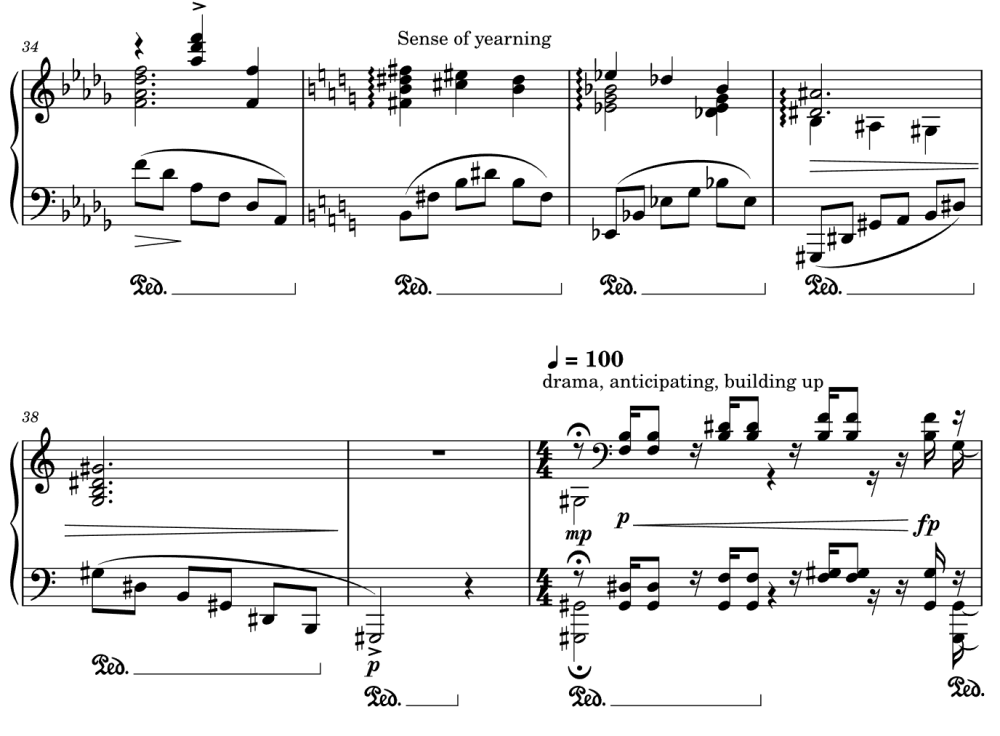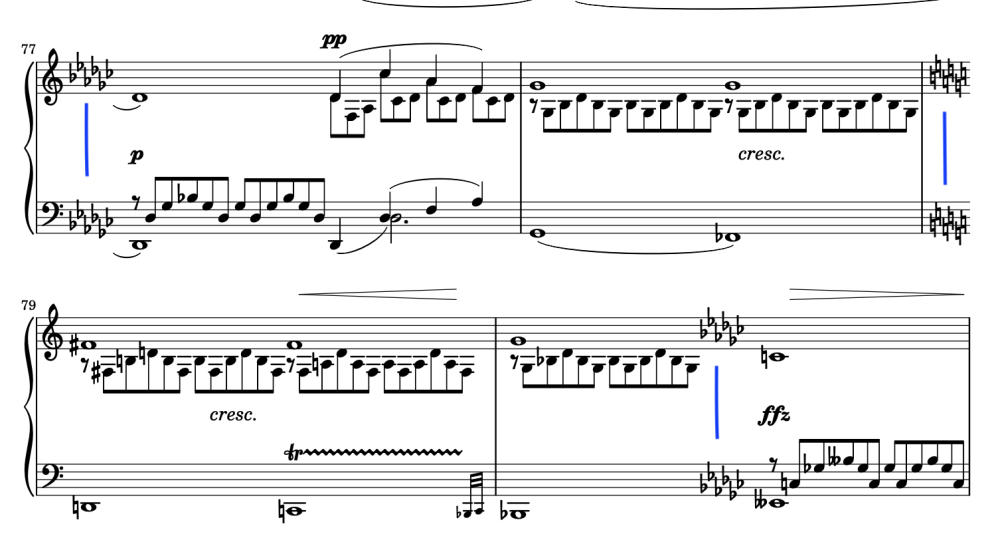Leaderboard
Popular Content
Showing content with the highest reputation on 05/12/2025 in all areas
-
Yeah I may sound arrogant, but during composing my pieces especially with the String Sextet(my best piece ever), I did think of myself, my friend, and also us as 2 members of the whole mankind and how my own ego fits with others, and how can I express and excavate myself in order to express mankind and Tao. I never think I claim music because my inspiration comes everywhere. Another "narcissistic" approach is I always listen to my music daily for composing coherently. Only by getting to know my music so much I can generate inspiration that is free and refreshing but at the same time reasonable and coherent. Henry3 points
-
I don't think it sounds arrogant. At its best, our music is a deep unconscious expression of our own essence. It carries our signature like nothing else does. If we don't love it, we don't have a healthy relationship with ourselves. Even if no-one else resonates with it - it's important that we do, else what are we making it for?2 points
-
The final piece of my four Piano pieces set and just a lame joke. Can be developed into a postmodern minimalistic masterpiece by repeating the joke forever and forever...... Joke in A flat major.pdf Hope you enjoy this one! Henry1 point
-
Sometimes when I've found myself listening to my favorite compositions written by me, over and over, I start to wonder if my own creativity is leading me to become an artistic narcissist. I guess it might make sense that as a composer succeeds more and more at writing music, it will become better and better and more the kind of music that they really enjoy listening to though. But regardless of how good or sophisticated their music actually is, do you think the tendency is for them to be more attracted to their own music? I've heard interviews with John Williams that surprised me from this perspective though. He commented that when he listens to his own music he can't help but hear all the flaws in it. When I listen to his music on the other hand, I don't hear any flaws - I mostly just hear beauty and good music. Is this him just being modest or does he really not enjoy his music as much as others do? Or maybe he's heard it so much that he's grown sick of it? Then there's also something to be said about writing music with flaws and all included in it. That's what gives music its variety and interest. I don't think writing music should be about perfection or always striving to create the next masterpiece - I think that kind of approach could lead to burnout if anything. So maybe when I listen to my own music over and over, I DO in fact hear all the flaws but I've grown to like them through repeated listenings? What do you think and how do you approach your own music? How much do you listen to it and how much is too much?1 point
-
I think this is a refreshing perspective on the potential positive aspects of this tendency of narcissism, in the specific context of music composition, with regard to my above response (dk why cant put this quote there but whatever). And especially here, I like how you expanded this idea to say it is not just that it can be positive for self development and composition, but can be a pre-requisite even, which removes the guilt of being narcissistic, as long as one strive for something bigger beyond oneself then, by viewing oneself as a vessel for something larger, narcissism is selfless, not selfish, or maybe at this point the specific words don't matter anymore, since the two are kind of one and the binary does not matter or exist anymore even.1 point
-
I think as long as it does not make you discriminate other people such that one would harm them, at least narcissism is not that destructive. That said, just only hearing your own music has the risk of being in ones echo chamber. Even if one gets objectively better and like to - and thus - hear more of ones music, which is nothing wrong, it would still be great to listen to other's people good stuff to enrich oneself. I think the term narcissism can be quite subjective, nothing wrong in itself though at times, it can be helpful to use more specific terms or like"X type of narcissism" to describe some behaviours or attitudes.1 point
-
lol, like Eric Satie's Vexations? but on a more serious note, I do like this piece, it is so classical yet so catchy and fun, something I would like to play, especially if forced to choose a classical piece that are not the ones I like , the boring ones. Also, this is generally suited for children and beginners to play, maybe at a slower tempo. One issue might be that it looks quite easily to trip off when playing in a fast tempo.1 point
-
Hello my dear friends, I wish you all the best! After the exhausting composition of the string quartet, I decided to take a little rest and create five short pieces for violin and piano. Each one has a slightly different character, so hopefully you will like at least one of them 😅 I am attaching a link to the playlist: https://youtube.com/playlist?list=PLkdhDBNsadAFcrUSvZ0IJecryMQIa8iF8&si=jkL63F2p1dLcfglt1 point
-
Hey there, Petr First of all, you're a wonderfully skilled composer. Your dissonant language has a lot of beauty in it to me, I'd be very curious to peek at the score! Could you post, or maybe for future youtube videos you have score videos? Regardless, I'm fascinated by the language you write with, as it's very different from mine (I'd love to learn 😄). Each of the five pieces in my opinion shows a skilled writer capable of writing for both instruments well. Perhaps you could have explored more technique, especially with the violin? With a more modern language, I expected more extended technique. Maybe I'm just used to that context? Even some pizzicato sections or slides would suffice to my ears. I enjoyed the music, I'm just thinking out loud after listening. Your samples sound good, but maybe the piano is a bit too wet sounding? Dunno, I'm not the best with all that. I guess maybe lower the reverb, or if using a DAW, make the reverb more dry. Again, that's probably subjective. As beautiful and intricate your writing is, you mentioned this: Yeah, perhaps, but I think you could have explored more. To me, this sounds like you wrote these fairly quickly one after another, and in turn they have a sameness of quality to them. For instance, aside from maybe the third piece (which is my favorite), you for the most part have the violin and piano constantly playing without rest. Also, to me, they don't always play harmoniously together. It's almost like a mismatch, where each one is playing something separate but they don't necessarily align with each other. They "fit", but without phrasing, it sounds like two people talking at the same time without each one listening to each other. With five pieces in the set, maybe one could of had the violin mostly pizz and light, or one could have the piano be mostly jaunty and choppy in the upper register. Know what I mean? For me, having different character implies different approaches to what the instruments are saying. Characteristic rhythms, or recognizable motifs, or more drastic differences in tempo, form, length, or range could be really beneficial. I'm not sure your overall purpose, as it sounds like you wanted something lighter on the noggin to write after a large piece, but if they're published as a set I would really plan more in advance as to how each of their characters differ. Keep in mind, we probably listen to vastly different types of music, and this is only from my point of view. I'm not sure about a lot of modern concert music pieces, I don't listen to them that much. Maybe what and how you're writing is in tandem with the trends of today, I wouldn't know. But from what I've learned, there are some techniques and theories of composition that transcend language. Wonderful phrasing and an array of textures go a long way in keeping your music engaging and interesting, and hopefully some of my thoughts help for the future. Love the music, thanks for sharing!1 point
-
So, I composed this piece a few years ago, and never published it. But I'm still posting it here just for the comments! (Note that "3 Piano Sonatas" is the title although i only wrote 1...) Sadly, I didn't add dynamics...1 point
-
Hello This is an interesting question. I think that whenever a piece is tonal, or has those roots, you have to specify tonalities in the armature. Whether they are all put in every time you modulate may be a matter of style. In baroque they didn't use to change the key signature with modulations. In romanticism it seems to be the norm. I think that leaving the score without any key signature is for atonal works, where all accidentals must be indicated. In your work, which by the way is very good, there are moments that can be expressed in another way. For example here. That mix of measures with sharps and flats is a bit strange and I also think that for a pianist it can be confusing. I would have continued with flats in bar 35, writing this bar, and bar 37 as Cb (which, yes, exists too). And in measure 39 place a key signature for Ab. What sounds there is an Ab6, or a G#6 (although in this case the F natural should be written as an E#). Anyway, you can see everything... I've always been amazed at what Schubert wrote in this piece. He already uses a strange time signature. The whole piece is in Gb except for a bar and a half towards the end where he breaks the whole key signature and puts there chords like D, D7/C, Gm/Bb... and resets the original key signature...1 point
-
Where you have a key change that only lasts one or two bars, I think the usual practice is not to change key signature. When the harmony is free roaming, it's quite common these days to have the whole piece in a neutral key (i.e. no key signature). That would also apply to atonal works, or those with no clear tonal centre. When there's a recognisable chord for a particular key, then you should use the enharmonic spelling for that key. (But you seem to have done this already in your work.)1 point


.thumb.png.8b5b433a341551e913a34392660bc95b.png)



